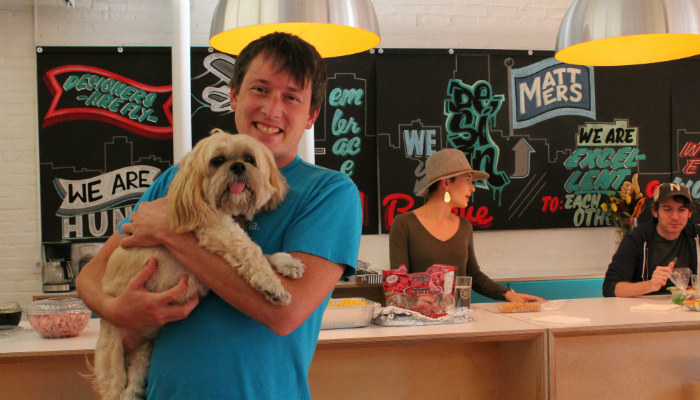
Dusty Davidson co-founded Flywheel in 2012 with Tony Noecker and Rick Knudtson to provide WordPress hosting and support for web designers. Since then Flywheel has grown to a team of 28 in downtown Omaha. Flywheel was the winner of two Golden Analogs this year for Best Culture and Best Startup of the Year. SPN caught up with Davidson over the phone to talk about the secret to great company culture.
SPN: Let’s start by talking about unlimited vacation time. How did you decide to offer that and what’s been your experience?
DD: I think we arrived at that because it fits within the culture we have at Flywheel, which is that we hire talented, responsible people and we instill a lot of trust in them to ensure they work hard and build great things, always with the best interests of the company in mind. When it comes to vacation, it’s no different. We don’t put limits on the amount of vacation that people take because we trust people won’t abuse it.
SPN: It seems like the big problem you’d face would be people not taking enough vacation. Do you ever have problems with that?
DD: Not taking vacation is the classic argument against unlimited vacation. We think the benefits of the policy outweigh the potential negatives of people not taking vacation. When we have reviews with people, part of it is, “Are you taking time for yourself? Are you taking time to spend with your friends and family?” If we go through a year and somebody’s only taken one or two days, that’s part of the conversation we have with them, so they understand they can, and should, and it’s a good thing. Taking time to rest is critical, especially in a high-stress, high-intensity growth company.
SPN: Flywheel also offers paternity leave. A lot of places don’t offer that. What was your thinking behind that?
DD: As we try to provide an extremely attractive benefits package, it makes sense to us to mirror what we see as an increasing trend across the world, which is providing generous, and I think appropriate, time off for both the mother and the father of a new kid. You’re seeing a major trend for this especially in places that are highly competitive for talent, frankly because it’s the right thing to do. It’s something that the best organizations provide, and if we want to put ourselves in the category of the best technology companies in the country, it just makes sense.
SPN: What are your company retreats like, and what’s your philosophy behind them?
DD: We do retreats once a quarter. Three times a year we do it off-site for two days, and once a year we take the company to Las Vegas. The retreats serve a few purposes. One, it’s a time to talk about strategic things, what’s happening in the company for the next quarter and the next year.
Two, we spend the week leading up doing all-company support. We are a support-centric organization. Supporting customers is at the heart of what we do. So during those weeks the entire company engages in that, so everyone in the company can experience what it’s like to be on the support side, also to experience what it’s like to be one of our customers.
Three, it’s just time for team building outside of the office in a casual, fun environment. We have dinner together. In Vegas we’ve toured Zappos together. We do things that bring the team together.
SPN: I talk to some founders who are really passionate about company culture and other founders who think culture is a lot of fluff. How do you draw the line from culture to profit?
DD: It’s always funny to me when you talk to people who think culture is a waste of time. There are certainly successful companies in the world with garbage culture. That’s fine. If that’s what they want to do, that’s fine for them. I look at it from a couple perspectives.
One is that we want to build the kind of company we want to be at every day. Making money is certainly one component of that, but enjoying the people you work with, enjoying the environment, and being surrounded by the absolute best people is part of it as well. Life is too short to go to work with a bunch of assholes.
Two, we take a very long term view of the world. At Flywheel we’re building an empire, not just a product. And if you’re doing that, if you’re taking a long term view of the world, you’re making concessions on short term gains. Culture is the classic example of that. We cater lunch everyday for our team, for example. We could certainly spend that money on more ads to drive more sales, and that would drive significantly more money than buying lunch does. But [we see] the long term gain of the camaraderie, the productivity boost of having them leave their desk or not skipping lunch, the recruiting benefits of having a desirable culture.
A lot of companies focus a lot on the bottom line, a lot on the product, and not enough on recruiting and retaining the absolute best people and making their company the absolute best place for the best people to work. Because at the end of the day, the best people have their choice of where they want to work. All other things being equal–pay, benefits–we want them to choose Flywheel. We forgo some short term gain in order to play a longer game of filling the team with the absolute best people.
SPN: You talk about hiring the right people, but obviously in any company you have to fire people. How do you deal with firing from a company culture perspective?
DD: I think everyone at Flywheel knows it’s our job to protect the culture at all costs. If we get the culture right, and we find the right people that are passionate about what they do, who are hard workers and good people, that’s the key to success. If we find ourselves in a situation where we made a mistake, it’s our responsibility to deal with that quickly and efficiently. Those things erode very quickly. It can have a souring effect. I think everyone on the team understands that.
The preferred way to protect the culture is to hire the right people at the beginning, but certainly in cases where you have to make a hard decision of letting someone go, if it’s not a good cultural fit, that’s a critical thing to do for the health of the company.
SPN: How do you deal with conflict and disagreement?
DD: When you have people who are passionate about what they are doing, you’re going to have disagreement. Part of having the right people in place is that they have strong opinions, loosely held. They’ll fight for something but can be convinced otherwise. A healthy discourse is part of innovating, part of pushing the envelope and part of growing aggressively. To that end, we want those kinds of personalities.
SPN: Sometimes when people talk about “cultural fit” I wonder if they just mean “people like me.” When you’re building your team, how do build a close-knit culture and still keep it diverse with different points of view?
DD: It’s a huge question, and you’re absolutely right that people confuse cultural fit for a homogeneous makeup. A commitment to diversity has to come from the top. [Flywheel] is not where we need to be from a gender, race or ethnic background perspective, but we have a desire and a push to do that. We know we can always do better because we know having diverse opinion and diverse backgrounds are things that contribute to an innovating company. If it’s all people like me, we’re only going to build the company I can think of. We’re never going to think outside the box.
Also when we look at hiring criteria, culture fit is huge but it’s more nebulous than just, “Are they fun to hang out with at lunch?” We look for things like, Are they passionate about what they do? Are they lifetime learners? Do they want to improve their craft? Are they impressive in some way? Do you walk out of a meeting with them and say, “I want to be around them because they will challenge me and improve me?”
SPN: What’s your best advice on culture to someone just starting their company?
DD: Two big pieces of advice. One, be deliberate about culture early on. Every company has a culture. And it’s incredibly easy to have a great culture at 4 people. It’s relatively easy at 10 or 12. At 20 it’s harder. At 50 it’s harder. At 1,000 it’s nearly impossible. You have to be deliberate about it early on and be pro-active about it.
Culture starts at the top and gets harder as you scale. It’s not impossible to have amazing culture as a large company–there are examples of companies who do that. But there are many more examples of companies who don’t, because at the top, at some point, they stopped emphasizing it.
Second, there’s a lot of confusion about culture being tied up in things like ping pong tables and free lunches and these sorts of things. We have those here, but I don’t even know if they are necessary. Even if they were necessary, they wouldn’t be sufficient.
As a company scales, what matters most in regards to culture is, Do you have the right people on the team? And do those people attract other people who are impressive and the right people for the team? People want to work with the best people. They want to feel valued. They want growth opportunities. Ultimately, culture relates more to those things, more than walls that are painted orange and trips to Vegas.
—
Note: Dusty Davidson is co-founder of Silicon Prairie News, which was acquired by AIM in January 2015.
Ryan Pendell is the Managing Editor of Silicon Prairie News.





7 responses to “Dusty Davidson on Flywheel: “Culture is about more than trips to Vegas””
Nice shirt!
Thought you might like that 🙂
[…] Dusty Davidson on Flywheel: “Culture is about more than trips to Vegas” – Three times a year we do it off-site for two days, and once a year we take the company to Las Vegas. The retreats serve a few … more than walls that are painted orange and trips to Vegas. Note: Dusty Davidson is … […]
Amazing environment you’re creating, Dusty!
[…] Dusty Davidson on Flywheel: “Culture is about more than trips to Vegas” – SPN caught up with Davidson over the phone to talk about the secret to great company culture … and once a year we take the company to Las Vegas. The retreats serve a few purposes. One, it’s a time to talk about … […]
[…] So what exactly does company culture consist of? According to a startup out of Nebraska, it’s more than trips to Vegas. […]
[…] So what exactly does company culture consist of? According to a startup out of Nebraska, it’s more than trips to Vegas. […]